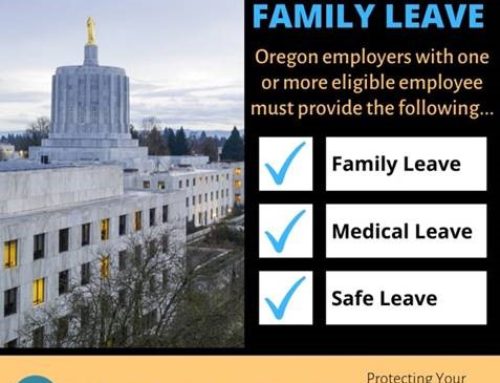Originally published September, 2015.
As a small business owner you have no shortage of distractions in your day – and most of us rely on our past experiences and knowledge to quickly respond to a situation and move on.
This would all be fine, except on the matter of human resources issues – that have steadily changed with the times over the last 10-15 years – through a steady flow of legislation, court cases and administrative law rulings.
But before you start dozing off, we’re not going to go through every major piece of employment legislation as a cure for your insomnia. Instead, here is a brief snapshot of some of the least known, and misunderstood employment laws and practices that I’ve seen among small employers.
Note: these topics apply to employment in Oregon, but many trends tend to stretch from State to State. You should examine your own State’s labor law web page for up to date information on your local situation.
Use of Credit Checks
During the 80’s and 90’s credit checks started to work into the pre-employment process – with the thought that personal money management was a direct reflection on an employee’s abilities in the workplace.
When the Great Recession started in 2008, we encountered thousands of people who through no fault of their own, fell on hard times – with a deteriorating financial position as a result. The feeling among lawmakers in many States was that these people were experiencing a type of “double-whammy” as they struggled to find work and were eliminated based on a situation that didn’t truly reflect poor fiscal management.
Many States, including Oregon, passed laws that prohibited using credit history as a basis for hiring an employee or for dismissing or otherwise managing the performance of an existing employee.
While there are exceptions as long as the credit requirement is substantially “job-related” (e.g. people working in banks & credit unions), for the most part, this tool is no longer available to a majority of employers – and should be eliminated from your processes immediately if you don’t fall into the exception criteria.
Ban the Box and the Use of Criminal History in the Hiring Process
Again, within the same timeframe as the Great Recession, employment related, fairness concerns surfaced from State Legislatures and the Federal Government. First, another “double-whammy” concern over the employment prospects of convicted criminals, has surfaced as a legislative theme in many States.
During the 80’s and 90’s it would have been common for an employment application to ask about your arrest record vs. convictions. Over time that gave way to convictions only, then felonies. As a result, many States, including Oregon, passed so called “Ban the Box” legislation that prohibits employers from inquiring about criminal convictions on applications, and in the earlier parts of the screening process.
While employers can still take convictions into consideration under many of these State Laws, the change is designed to allow those with a conviction, a better chance of making a positive impression on the prospective employer first, and ultimately improve their chances of employment.
Second, beyond the interest of State Legislatures responding to employment barriers for those with criminal convictions, the Equal Employment Opportunity Commission (EEOC) began issuing guidance in early 2010 to employers regarding their obligations under the 1964 Civil Rights Act. Their position was based on repeated, earlier EEOC guidance in the prior two decades, in addition to court rulings – that identified how incarceration disproportionately affected minority populations.
While again, there were exceptions based on the role and industry, employers were specifically instructed to consider criteria such as:
· The nature and gravity of the offense
· Time that has passed since the offense, conduct or completion of the sentence
· The nature of the job sought
The long and short for small employers was to be aware of this additional requirement, have a process in place to screen with it in mind, and if someone is going to be excluded based on criminal conviction, to clearly document the reasoning against your written policy.
Restrictions on Discussing Your Pay
The practice of prohibiting employees from discussing pay & benefits is familiar to most of us and seems inherently practical as an employer. Absent information about everyone’s qualifications and experience, the knowledge can introduce disruption in the workplace, strain relationships and otherwise cause general resentment.
On the opposite side, concern over pay discrimination and equal pay for equal work, had begun to work their way into that discussion though. Beginning in the 80’s, and through 2014 at least 10 States have adopted legislation that prohibits discipline, discharge or other punitive action against an employee for revealing their pay.
The National Labor Relations Board (NLRB), whose mandate is to administer the 1935 National Labor Relations Act (NLRA), has stated repeatedly that the law does not allow this broad restriction among private employers – as it falls under “concerted activity”. Nonetheless, the practice generally continued in most workplaces.
In early 2013, the NLRB made headlines by ruling in favor of an employee who had been discharged for discussing her pay. That employer was ordered to issue back pay and offer her the opportunity to come back to her prior job.
This administrative ruling served as a general wake up call to the private sector about the legality of this long-standing practice – and enforcement powers of the NLRB to respond.
Conclusion
While major corporations have ready access to attorneys and HR Staff, the small business owner is doing their best to get the basics done – day after day – while trying to do what makes sense and has worked in the past.
When that begins to intersect the HR world, is when the business owner can get into trouble, and find themselves mired in a government inquiry or distracted by an opposing attorney, looking to maximize a settlement to leave you alone.
It’s in your interests to stay up on these changes, or better yet, to establish a relationship with an HR professional that you can lean on before, during and after you encounter an issue.







